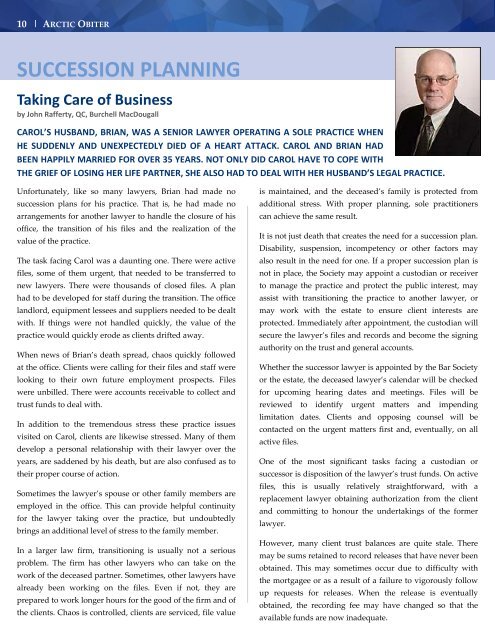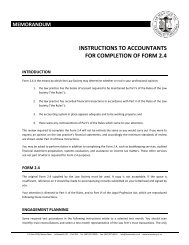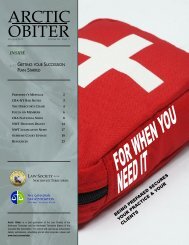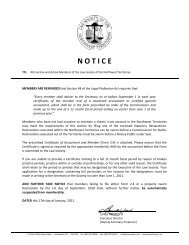ARCTIC OBITER
June - Law Society of the Northwest Territories
June - Law Society of the Northwest Territories
Create successful ePaper yourself
Turn your PDF publications into a flip-book with our unique Google optimized e-Paper software.
10 | <strong>ARCTIC</strong> <strong>OBITER</strong><br />
SUCCESSION PLANNING<br />
Taking Care of Business<br />
by John Rafferty, QC, Burchell MacDougall<br />
CAROL’S HUSBAND, BRIAN, WAS A SENIOR LAWYER OPERATING A SOLE PRACTICE WHEN<br />
HE SUDDENLY AND UNEXPECTEDLY DIED OF A HEART ATTACK. CAROL AND BRIAN HAD<br />
BEEN HAPPILY MARRIED FOR OVER 35 YEARS. NOT ONLY DID CAROL HAVE TO COPE WITH<br />
THE GRIEF OF LOSING HER LIFE PARTNER, SHE ALSO HAD TO DEAL WITH HER HUSBAND’S LEGAL PRACTICE.<br />
Unfortunately, like so many lawyers, Brian had made no<br />
succession plans for his practice. That is, he had made no<br />
arrangements for another lawyer to handle the closure of his<br />
office, the transition of his files and the realization of the<br />
value of the practice.<br />
The task facing Carol was a daunting one. There were active<br />
files, some of them urgent, that needed to be transferred to<br />
new lawyers. There were thousands of closed files. A plan<br />
had to be developed for staff during the transition. The office<br />
landlord, equipment lessees and suppliers needed to be dealt<br />
with. If things were not handled quickly, the value of the<br />
practice would quickly erode as clients drifted away.<br />
When news of Brian’s death spread, chaos quickly followed<br />
at the office. Clients were calling for their files and staff were<br />
looking to their own future employment prospects. Files<br />
were unbilled. There were accounts receivable to collect and<br />
trust funds to deal with.<br />
In addition to the tremendous stress these practice issues<br />
visited on Carol, clients are likewise stressed. Many of them<br />
develop a personal relationship with their lawyer over the<br />
years, are saddened by his death, but are also confused as to<br />
their proper course of action.<br />
Sometimes the lawyer’s spouse or other family members are<br />
employed in the office. This can provide helpful continuity<br />
for the lawyer taking over the practice, but undoubtedly<br />
brings an additional level of stress to the family member.<br />
In a larger law firm, transitioning is usually not a serious<br />
problem. The firm has other lawyers who can take on the<br />
work of the deceased partner. Sometimes, other lawyers have<br />
already been working on the files. Even if not, they are<br />
prepared to work longer hours for the good of the firm and of<br />
the clients. Chaos is controlled, clients are serviced, file value<br />
is maintained, and the deceased’s family is protected from<br />
additional stress. With proper planning, sole practitioners<br />
can achieve the same result.<br />
It is not just death that creates the need for a succession plan.<br />
Disability, suspension, incompetency or other factors may<br />
also result in the need for one. If a proper succession plan is<br />
not in place, the Society may appoint a custodian or receiver<br />
to manage the practice and protect the public interest, may<br />
assist with transitioning the practice to another lawyer, or<br />
may work with the estate to ensure client interests are<br />
protected. Immediately after appointment, the custodian will<br />
secure the lawyer’s files and records and become the signing<br />
authority on the trust and general accounts.<br />
Whether the successor lawyer is appointed by the Bar Society<br />
or the estate, the deceased lawyer’s calendar will be checked<br />
for upcoming hearing dates and meetings. Files will be<br />
reviewed to identify urgent matters and impending<br />
limitation dates. Clients and opposing counsel will be<br />
contacted on the urgent matters first and, eventually, on all<br />
active files.<br />
One of the most significant tasks facing a custodian or<br />
successor is disposition of the lawyer’s trust funds. On active<br />
files, this is usually relatively straightforward, with a<br />
replacement lawyer obtaining authorization from the client<br />
and committing to honour the undertakings of the former<br />
lawyer.<br />
However, many client trust balances are quite stale. There<br />
may be sums retained to record releases that have never been<br />
obtained. This may sometimes occur due to difficulty with<br />
the mortgagee or as a result of a failure to vigorously follow<br />
up requests for releases. When the release is eventually<br />
obtained, the recording fee may have changed so that the<br />
available funds are now inadequate.

















